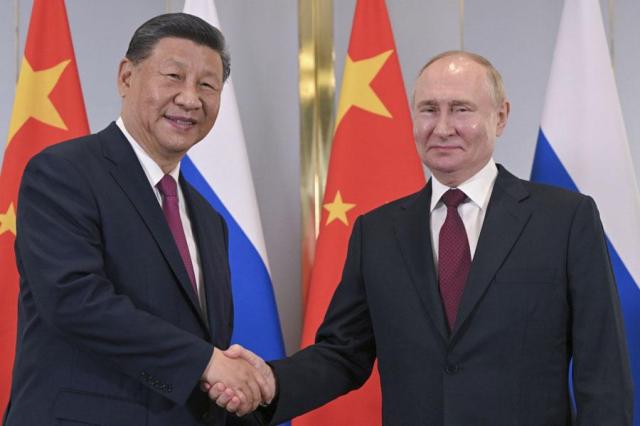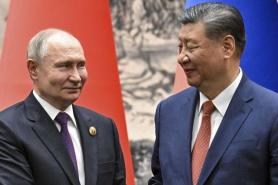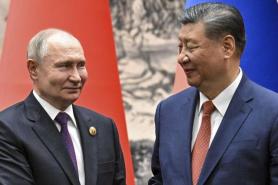
Yet beyond the headlines of the war in Ukraine, an even more significant challenge is looming. There's no doubt the world is seeing the reconfiguration of the existing international order. China and Russia appear to be gathering together an alliance which will be pitted directly against the collective west.
The latest manifestation of this shift was the summit of the Shanghai Cooperation Organization (SCO) on July 3-4 in Astana, Kazakhstan. The SCO has its origins in the "Shanghai Five" mechanism, established by China, Russia, Kazakhstan, Kyrgyzstan and Tajikistan in 1996. This morphed five years later into the SCO, with the addition of Uzbekistan.
India and Pakistan joined in 2017, Iran in 2023 and Belarus was admitted at the Astana summit last week. Afghanistan and Mongolia have observer status in the SCO. NATO member Turkey is one of 14 so-called dialogue partners across Asia, the Middle East and the south Caucasus.
There are clear signs that China and Russia have ambitions to turn the SCO into a more formidable counterweight to the west. Rather than focusing on the range of some 25 documents and declarations adopted at the summit, most of which are – at best – statements of intent, the two key leaders' speeches and press statements tell a better story of why the SCO should be taken more seriously.
Russian president Vladimir Putin used his opening comments at a meeting with his Chinese counterpart Xi Jinping on the SCO sidelines to proclaim the success of their alliance. He said: "Russia-China relations, our comprehensive partnership and strategic cooperation, are going through the best period in their history."
In turn, Xi gave Putin his strong backing, noting that Russia and China "should keep upholding the original aspiration of lasting friendship... and make tireless efforts to safeguard our legitimate rights and interests and safeguard the basic norms governing international relations."
In his address at the SCO summit, Putin expressed his belief that a "multipolar world has become a reality." He further claimed that "the Shanghai Cooperation Organization and BRICs (the trading bloc comprising Brazil, Russia, India, China, South Africa) are the main pillars of this new world order," adding: "These associations are powerful drivers of global development processes and the establishment of genuine multipolarity."
This was echoed in Xi's statement that "under the new circumstances of the new era, the vision of our organisation is widely popular, and that SCO member states have friends across the world."
Xi went on to say that the SCO needs "to have a complete set of measures under the security cooperation mechanisms, because more lines of defense will give us more protection."
Challenging the west
This is perhaps the clearest indication yet that Russian and Chinese views on the SCO as a future counterweight to NATO are beginning to converge.
There are also other (not so) subtle signs that Russia and China are using different tools to strengthen their relative position vis-à-vis the west. The strategy appears to be to try to weaken NATO and drive a wedge between the US and European members. There are already moves afoot to promote relations with NATO's more Russia- and China-friendly member states, such as Hungary and Slovakia.
Xi and Putin both emphasized the idea of Eurasia in their official statements. For both of them, this means reducing the role of the U.S. in the region.
For Putin, the main pathway is "a new system of bilateral and multilateral guarantees of collective security in Eurasia." The long-term plan is "to gradually phase out the military presence of external powers in the Eurasian region." For Xi, the route is more an economic one, focused on strengthening trade and infrastructure connections between China and the EU. China will do this by promoting its belt and road initiative and its transport corridors – as he did during his official state visit to Kazakhstan on the eve of the SOC summit.
But whether Putin and Xi can succeed in turning the SCO into a credible security competitor to NATO is by no means clear. The SCO lacks the collective defense commitments of NATO's Article 5. Its internal structures are weak, and the only institutionalized security task is fighting terrorism, assigned to the Regional Anti-Terrorist Structure (SCO RATS).
The key concern for the SCO here remains Afghanistan, something also highlighted in remarks delivered at the SCO summit by the UN secretary general António Guterres, who urged leaders that "the central goal of our multilateral system must be peace." He stressed that the SCO has both the influence and the duty to push for that goal.
The SCO is also plagued by internal discord between key members of the organization. India and Pakistan remain at loggerheads over Kashmir. Similarly, India and China have a longstanding – and sometimes violent – quarrel over border issues. Indian prime minister Narendra Modi wasn't even at the summit, preferring to send his foreign minister to deliver a thinly-veiled swipe at his two neighbors.
But it would be a mistake for the west to dismiss the SCO as insignificant. It's much larger than NATO, both in terms of territory and population, as well as having a significant foothold in Europe via Russia and Belarus. And its countries account for 30 percent of global GDP.
As China and Russia become more closely aligned, their influence across Eurasia is certain to grow and expand – unless the west takes a page out of Moscow's and Beijing's playbook and actively seeks to divide them, rather than driving them ever closer together.
-------------------------------------------------------------------------------------------------------------------------
Stefan Wolff is a professor of International Security at University of Birmingham in England.
This article was republished under a Creative Commons license with The Conversation. The views and opinions in this article are solely those of the author.
https://theconversation.com/xi-and-putin-talk-up-growth-of-their-eurasian-bloc-organisation-as-counterweight-to-nato-234100
Copyright ⓒ Aju Press All rights reserved.


